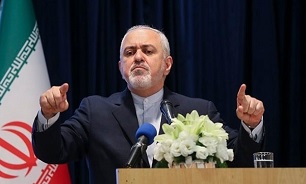US’ Harsh Policies against Iran, China, Russia Not to Reverse Shift in Global Power
 In two successive tweets on Friday, Zarif said the US cannot change the fact that global power is shifting in favor of Iran, Russia and China by resorting to sanctions and killing deals, advising Washington to, instead, adapt to the new realities on the world stage and “stop isolating itself”.
In two successive tweets on Friday, Zarif said the US cannot change the fact that global power is shifting in favor of Iran, Russia and China by resorting to sanctions and killing deals, advising Washington to, instead, adapt to the new realities on the world stage and “stop isolating itself”.
The Iranian foreign minister made the comments hours after the US officially withdrew from the Intermediate-Range Nuclear Forces (INF) Treaty with Russia — a landmark Cold War-era arms control agreement signed between the two sides in 1987.
This came shortly after the US imposed a new set of sanctions against Russia over its alleged role in the poisoning of an ex-spy in the UK in 2018.
On Thursday, US President Donald Trump also announced plans to impose an additional 10% tariff on $300 billion worth of Chinese imports starting next month as part of an ongoing trade conflict with China.
Washington has likewise abandoned a multilateral deal on Iran’s nuclear program and unleashed harsh economic sanctions against the Islamic Republic.
The “US should stop isolating itself and adapt to new global realities. International commerce and power are shifting: neither economic terrorism against China and Iran nor exiting INF Treaty with Russia will reverse that,” Zarif said in one of the tweets on Friday.
In a follow-up tweet, the top diplomat criticized the US for its anachronistic practice of attempting to contain what it perceives as “Great Powers” — now through sanctions.
Along with the tweet, Zarif provided a screenshot of a Daily Telegraph news item dating back to April 19 about US Secretary of State Mike Pompeo’s appeal to the NATO military alliance for unity against what he called “great power” challenges from Russia, China and Iran.
Pompeo was using the classic concept of great-power competition — which refers to a specific pattern of relations between rival powers in the 19th and early 20th centuries.
“It appears that @SecPompeo’s paranoia about ‘Great Powers’ is becoming a true phobia,” Zarif said. “Wake up: The era of ‘Great Powers’ is long past.”
In his first tweet, Zarif also pointed to the Iranian initiative for a non-aggression pact among Persian Gulf countries in an attempt to end tensions in the strategic region.
The Iranian foreign minister hailed the progress in that proposal, which he said has led to the isolation of a hawkish group of politicians and regional leaders trying to pressure and isolate Iran by undermining the 2015 nuclear deal with Iran and instigating regional tensions.
“As Iran’s regional dialog and non-aggression pact advance, #B_Team shrinks,” referring to the hawkish group comprising of US National Security Adviser John Bolton, Israeli Prime Minister Benjamin Netanyahu, Saudi Crown Prince Mohammed bin Salman and Abu Dhabi Crown Prince Mohammed bin Zayed Al Nahyan.
Zarif expressed Iran's readiness for a non-aggression pact during a visit to Iraq in late May, amid heightened tensions between Tehran and Washington.
He said back then that Tehran sought the best of relations with the Persian Gulf littoral countries and would welcome any proposals for dialog and de-escalation toward that end.
Early in last month, Zarif said that Washington is no longer capable of paying the price to keep its status as the most powerful country in international relations, adding that the US economy is not as unrivaled as it was before and consequently incompetent to pay the price for American superiority.
Speaking on the sidelines of the National Day of Industry and Mining, Zarif told reporters that Europe is now after independence from the US in its economy because the US economy is no longer the unchallenged super economy of the world.
“The point that the US economy is not anymore the unrivaled economy in international relations will have dire consequences for the US in the long run,” the Iranian diplomatic chief highlighted.
Touching upon the EU-proposed mechanism for bypassing anti-Iran sanctions of the US, known as the Instrument in Support of Trade Exchanges (INSTEX), Zarif said that the financial vehicle is not on a par with Europeans’ commitments to Tehran, however, it indicates that the closest of the US allies are distancing themselves from Washington.
Late in May, Iranian Parliament Speaker Ali Larijani quoted Iran’s Supreme Leader Ayatollah Seyed Ali Khamenei as saying that US utilitarianism is in decline as it creates 'international anomalies.
He added the creation of the ISIL terrorist group had roots in the US utilitarianism with the aim of destroying the Islamic nations.
Also, in March, Zarif also censured Washington’s foreign policy and interventionist role in the Middle East, asserting, “Its recklessness just displays panic of an empire in decline.”
Early in November, Top Military Aide to the Iranian Supreme Leader Major General Yahya Rahim Safavi asserted that the US' power is fading away and Washington is unable to win control over Iranians’ economy and fate.
Message end/
